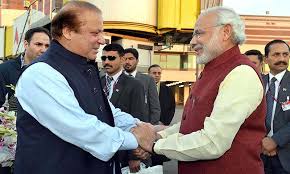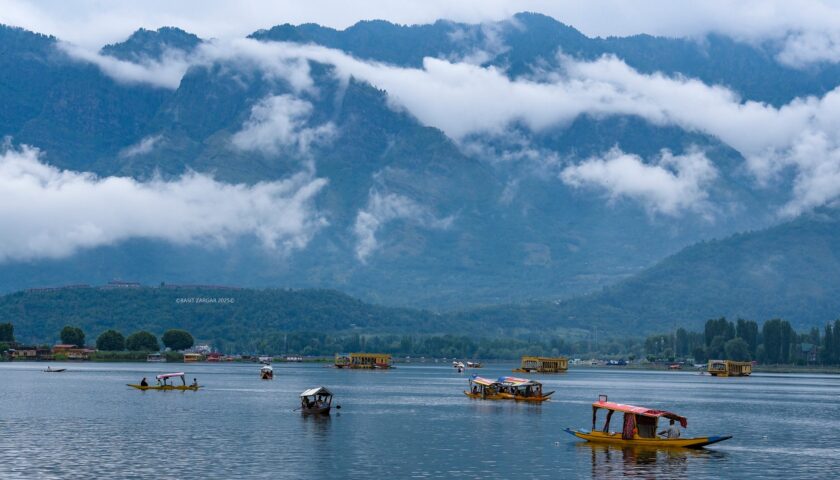Modi: Reducing the Art of Diplomacy to What Matters Most
Dr. Ghulam Nabi Fai December 30, 2015
“The most difficult thing in any negotiation, almost, is making sure that you strip it of the emotion and deal with the facts.” SenatorHoward Baker
 There’s a lot to be surprised about in the recent visit by India’s Prime Minister Narendra Modi to Lahore. The summer-long problems at Kashmir’s Cease-fire Line, persistent efforts by the BJP to usurp political power in Kashmir, the oft-repeated misinformation that Kashmir is “an integral part of India,” and the NSA meeting scheduled at Ufa which was cancelled over such things as Pakistan’s insistence that Jammu and Kashmir be included in discussions, would certainly lead most observers to believe that any meaningful dialogue was off the table anytime in the near future.
There’s a lot to be surprised about in the recent visit by India’s Prime Minister Narendra Modi to Lahore. The summer-long problems at Kashmir’s Cease-fire Line, persistent efforts by the BJP to usurp political power in Kashmir, the oft-repeated misinformation that Kashmir is “an integral part of India,” and the NSA meeting scheduled at Ufa which was cancelled over such things as Pakistan’s insistence that Jammu and Kashmir be included in discussions, would certainly lead most observers to believe that any meaningful dialogue was off the table anytime in the near future.
However, if you look at other recent events, a secret meeting between Prime Minister Modi and Pakistan’s Prime Minister Nawaz Sharif (denied by the government) is alleged to have occurred on the sidelines of the 2015 SAARC summit at Kathmandu during which media reports suggest that “Both the leaders shared their constraints while agreeing they needed more time and greater political space to move forward with public engagements.” One can’t help but get the sense that the two leaders are wasting no time in implementing whatever agenda may be involved.
In November 2105, Nawaz Sharif is reported to have stated during a meeting with British Prime Minister Cameron during the Commonwealth Heads of Government Meeting that for a sustainable peace, Pakistan was ready for dialogue with India without preconditions.
On December 6, 2015 with Modi’s stamp of approval and reportedly through his initiative, India and Pakistan Foreign Ministers and the National Security Advisors held a meeting in Bangkok for four hours, covering “peace and security, terrorism, Jammu and Kashmir, [and] other issues including tranquility over the Line of Control.” This obviously represents an achievement for Pakistan in negotiations, since India had apparently hit a stonewall in attempting to restrict discussions to “terrorism.”
On December 9, 2015, just three days later, India’s External Affairs Minister Sushma Swaraj announced during a visit to Islamabad’s Heart of Asia conference that India and Pakistan were resuming bilateral dialogue.
Although much credit is being given to Prime Minister Modi for taking this step in visiting Pakistan, it can hardly be believed that Prime Minister Modi was just popping in on Prime Minister Sharif because he needed to borrow some sugar. Modi at times seems like an unpredictable person, but it is doubtful that Sharif was drawn into unknown and unpredictable circumstances like some stranger. Without a little planning, this could have turned into a major faux pas. The red carpet and all the fancy suits were hauled out of storage in Prime Minister Sharif’s garage and were there to greet Prime Minister Modi. The stroll hand in hand as the two engaged one another looked like a pair of pigeons who had been reunited after a storm in the Arabian Sea.
The Indian National Congress wasn’t too happy about this, however, saying that the visit was not very “statesman-like” and that diplomacy required a little more gravitas. No doubt, that’s why very little headway is made in conventional diplomacy. It gets bogged down in place settings, silver and heavy protocol about who sips tea first, and never gets up close and personal. The personal style of Prime Minister Narendra Modi is to be greatly admired, because it demonstrates that he likes to think outside that gold-embossed box.
This is also a hallmark of those rulers who skirt democratic process and counsel in favor of doing what feels good. For any other leader, this could be quite dangerous. But this Indian leader seems on a carefully crafted mission, and our guess is that, given Modi’s background, it’s all about money and the flow of dollars from industrial and consumer needs abroad into Indian coffers. And to those who control governmental policy, no other good has higher esteem. The corporate overseers are always at work, and the winds favor peace or war, depending on where the dollars flow. As the Economic Times reported, “India’s trade with Pakistan could get a boost through a more liberal visa regime, closer links between business houses and grant of most favored nation status to the country by the Nawaz Sharif government.”
There has also been talk of cooperation in the gas and petroleum sectors and “the possibility of supplying up to 5 million cubic mets gas per day by extending the Dadri-Bawana-Nangal pipeline from Jalandhar via Amritsar to Lahore, and establishing a 500 MW high-voltage direct current link from Amritsar to Lahore to facilitate power trading.”
There is a need to clarify the assertion made by Ram Madhav, the National Secretary General of BJP that “The only outstanding issue with regard to the Kashmir problem is the Kashmir under Pakistan occupation…The Kashmir that is an integral part of India, it has been proved time and again that it’s an integral part of India.” Mr. Madhav does not know what President John F. Kennedy said on July 25, 1961, “We cannot negotiate with people who say what’s mine is mine and what’s yours is negotiable.” It also seems to me that Mr. Madhav is following the Costa Rican proverb that says “Every word has three definitions and three interpretations.” The world powers should, therefore, persuade both India and Pakistan to define the parameters of the dialogue over the Kashmir dispute in such a way so that there is only one definition and one interpretation of any joint communiqué they may issue in future.
We know that all international conflicts ultimately were resolved on the negotiating table. If that is true then the world powers should become deeply engaged in order to make sure that the peace process between India and Pakistan does not get derailed. They can play a bridge building to bring India and Pakistan together so that the animosity is done away with and the dawn of dialogue and engagement is sustained. They need to make sure that the policy of conflict resolution adopted by both New Delhi and Islamabad over the Kashmir dispute is consistent, coherent, transparent and dependable.
Rest of us need to wait till we see the translation of these important gestures between New Delhi and Islamabad into substantive policy procedures that will ultimately help in resolving the bone of contention – the Kashmir dispute – to the satisfaction of all the concerned parties – India, Pakistan & the people of Kashmir. That day may come when Kashmir’s desires and interests as well as their representation at the table are recognized. Any process that ignores those sentiments will not only prove to be an exercise in futility but can also cause incalculable human and political damage for the people of the region of South Asia – home to one-fifth of total human race.
Dr. Fai is the Secretary General of the World Kashmir Awareness. He can be reached at: 202-607-6435 OR gnfai2003@yahoo.com




